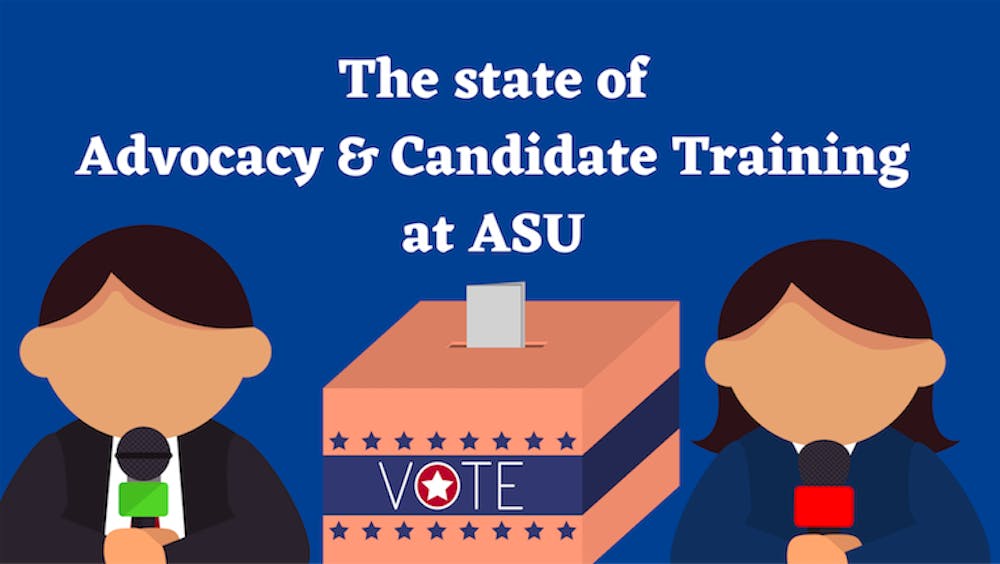Students from the School of Social Work at ASU are calling for the creation of an advocacy and candidate training program for which implementation may come this year.
During the spring 2017 semester, social work students Belinda Escalante, Guadalupe Vela and Patricia Kerns designed a needs assessment for their class to examine how undergraduate social work students felt about advocacy.
This effort, titled “Social Workers: The Community Voice in Advocacy," was completed by 84 students out of 684 that were reached out to in a window of about two weeks.
The results largely showed there was a need or desire to learn more in the areas of legislative advocacy and using technology in advocacy.
Escalante, the outgoing president of the Macro Social Work Student Network, said her organization would like to see a nonpartisan, extracurricular program for training students and had initiated talks with the School of Social Work, the College of Public Service and Community Solutions, the Morrison Institute for Public Policy and the Congressman Ed Pastor Center for Politics and Public Service at the end of the last semester.
Currently, there are a few efforts that seek to boost civic engagement and understanding at ASU, but usually at a more basic level such as voter registration provided by the student governments or targeted at a different audience.
One such program is the Arizona Legislative Academy, which is run by former Speaker of the Arizona House of Representatives and current Corporations Commissioner Andy Tobin.
Tobin said the program is the product “of a vision by Dr. Crow at ASU that they wanted to find a way to help train lawmakers because of course, things are far more complicated today and far more issues than we ever had to deal with.”
Despite potential concerns about partisanship, the academy successfully brought 36 experts to both provide information and serve as a future resource for one of the largest classes of freshmen legislators in years.
The program has received positive reviews from questionnaires given to staff, and every freshman legislator showed up to the program with only one having to leave early due to illness.
Tobin said he believes the academy is a great resource that could be expanded along the lines of what they did with the Mandela Washington Fellowship for Young African Leaders and Young Southeast Asian Leaders Institute.
“We sent them over there and Senator (Kimberly) Yee gave them a half-a-day program, a tour and Q&A about what we do, and I think those things are appreciated," Tobin said. "I think we can expand them to our college courses here and for people like me that can take them over, sit down and have some conversation about public policy and how does this move and why do things get hung up and how is our constitution written.”
Alberto Olivas, the executive director of the Pastor Center, found the idea presented by Escalante and other MSWSN members to be “exactly in line with the kind of things we wanted to do and, very helpfully, they had already surveyed a lot of people on what students would be interested in doing.”
Who will ultimately be responsible for a new program seems to still be up in the air.
Escalante expresses concern that “because we’re students and we have other obligations, we just don’t have the time to give it 100 percent. So we said we would love to collaborate and if it could be spearheaded through the Ed Pastor Center.”
However, the Pastor Center, which seeks to promote, publicize and encourage political engagement and public service among ASU students, may not be able to run the program on its own as it focuses on a more student-involved strategy to help students learn and retain more from their experiences.
Olivas said there are also practical factors.
"The Pastor Center wasn’t built on a staff-run program model," he said. "It’s built on a model of students doing programs with the support of staff, namely me, because I am the entire Pastor center in terms of employee base. I have half of an admin assistant. Really, I am not sufficient in terms of staffing to run programs.”
Olivas said he is currently evaluating options, including the possibility of a part-time or a full-time intern. He said having the MSWSN as a partner would "be the most practical."
For now, both Escalante and Olivas agree that the next steps include putting together a program and reviewing existing programs at other universities such as Rutger’s use of the Ready to Run candidate training and Harvard University’s From Harvard Square to the Oval Office initiative.
Reach the reporter at raboyd@asu.edu or follow @RyanAndrewBoyd on Twitter.
Like The State Press on Facebook and follow @statepress on Twitter.




